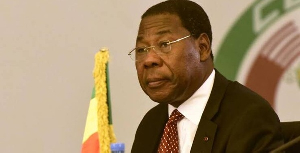Accra, July 27, GNA - Mr J. B. Danquah Adu, Deputy Minister of Women and Children, on Wednesday decried the low level of women's participation in politics saying, it was unlikely the country would achieve equitable participation in decision-making and governance with the trend.
He said with an estimated nine per cent of women at the helm of decision at the national and about seven per cent in the district assemblies, women needed to work harder to attain decision-making positions.
Mr Adu was speaking at the opening of the second biennial conference on "Enhancing Women's Participation in District Assemblies: Strategies for District Election 2006, which opened in Accra. The meeting under the theme: "Positioning Women and their Concerns in Governance Processed in Ghana" was organised by the Coalition on the Women's Manifesto for Ghana and hosted by ABANTU for Development, a local nongovernmental organisation (NGO), with sponsorship from Action Aid International Ghana.
Mr Adu said the Ministry was committed to ensuring gender mainstreaming in all government sectors and was collaborating with various partner agencies to promote the well being of women and children.
He said it was essential that NGOs and other development partners assisted the Government to undertake and intensify a number of capacity building programmes for both potential and aspiring women candidates and to equip them with information, knowledge and skills required to engage in the local or district governance process.
"Advocacy institutions and groups should partner with and use the media in a positive portrayal of women and sensitise the public on the need to vote for women candidates," he said.
Dr Rose Mensah-Kutin, Regional Programme Manager, ABANTU for Development, said the constitutional provision for active participation of all citizens at the local level had not worked to the benefit of women.
"In 1998 out of an overall total of 4,820 elected candidates, only 196 were women. In 2002, out of a total of 4,583 candidates elected only 341 were women. This means there was only an increase in the number of women elected to District Assemblies from three per cent in 1994 to five per cent in 1998 and to seven per cent in 2002."
With reference to appointed members, Dr Mensah-Kutin said women constituted 35.5 per cent of the total membership, which was an improvement over time, though below the 50 per cent target and expressed regret that only six districts had been able to attain the 50 per cent target for women.
Mrs Roseline Obeng-Ofori of Action Aid Ghana said the voices of women could no longer be ignored in governance since they constituted the majority of the population.
She urged the Assembly Women to be at the forefront of the campaign to rid the district assemblies of corrupt practices. July 27, 2005
Politics of Wednesday, 27 July 2005
Source: GNA












